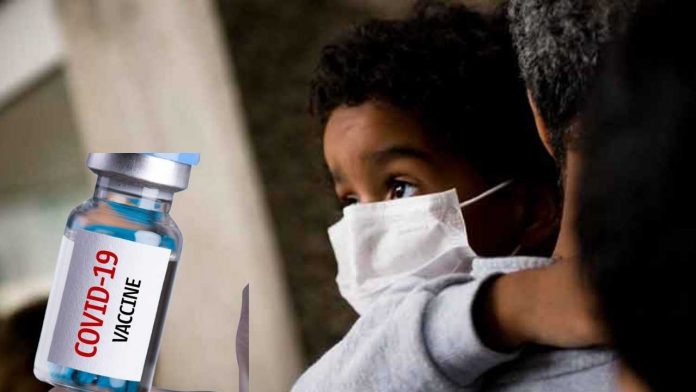Pfizer, a vaccine manufacturer, said Monday that testing have showed that its Covid-19 vaccine is effective in children aged 5 to 11.
It’s now talking to the US Food and Drug Administration about the findings, and Dr. Scott Gottlieb, a former FDA commissioner who is also on the board of Pfizer and may not have direct knowledge but certainly has enough information to make an educated guess, says kids as young as 5 years old could be getting Covid-19 shots by the end of October.
However, the vaccines given to these younger children will very probably be different from those given to teenagers and adults, at least in terms of dose. Here’s why it’s different, as well as what you should know about Covid-19 vaccinations for kids:
In younger children, smaller doses are more effective.
Adults and children have distinct immune systems. Knowing this, Pfizer experimented with different doses in children aged 5 to 11. It turns out that even at low doses, children have a robust immunological response. As a result, children under the age of 12 will virtually probably receive a 10-microgram vaccine dose, compared to a 30-microgram dose for adults.
In fact, according to Dr. Robert Frenck, who leads vaccine trials at Cincinnati Children’s Hospital, most adults might get by with fewer doses as well.
“In adults, we looked at 10 micrograms, 20 micrograms, and 30 micrograms,” Frenck said.
“We discovered that a 10-microgram dose produces a very good immunological response in 18- to 55-year-olds,” he continued.
“However, those aged 65 and up did not respond as effectively to the lesser doses, which is why we picked the 30-microgram dose for those aged 18 and up.”
Last year, there was no time — or reason, according to Frenck — to fine-tune the dosing. “We wanted to get a vaccine out swiftly during a pandemic,” he told Media Persons John Berman.
“We knew we needed the 30 micrograms for those aged 65 and more to elicit the highest immunological response, and we also knew the 30 micrograms were well tolerated in younger persons. So we just gave everyone the same dose.”
Even older children will not be harmed if they receive the lower dose.
“My guess is that if we gave a 12-year-old a 10-microgram dose, they would still have a similar immunological response as if we gave them a 30-microgram dose,” he added.
Doctors are trying a 3-microgram dosage of vaccination for youngsters under the age of five.
Because of the lesser dose, side effects are kept to a minimum.
According to Frenck, the Pfizer vaccination appears to be highly safe in younger children so far. “What we discovered is that the children’s negative effects paralleled exactly what we saw in adults,” he stated.
“Pain at the injection site is the most common symptom. I’m also experiencing a headache and possibly weariness. Fevers and chills were uncommon, with only about 10% to 11% of the youngsters experiencing them. Side effects were similar to, if not identical to, those experienced by adults, lasting a day or two before returning to normal.”
Many parents may be concerned about reports of myocarditis, a rare heart illness linked to both Moderna’s and Pfizer’s vaccines.
“And so we’ve observed that as a rare adverse effect has been related with it appears like the second dosage of either the Moderna or Pfizer vaccine,” Frenck told reporters.
“Rare refers to a possibility of a few per 100,000, so there’s still a 99.999 percent chance this won’t happen. It has mostly affected teenage boys, and it has been mildly treated with Motrin (ibuprofen), and they have improved.”
According to Frenck, the only two side effects not seen in clinical trials were rare cases of myocarditis that were easily treated and blood clotting seen in mostly older women who received the Johnson & Johnson or AstraZeneca vaccines.
“We’ve provided literally hundreds of millions of doses of vaccination to adults and teenagers across the country beyond the clinical studies today,” Frenck added.
“If we haven’t seen anything with the hundreds of millions of doses, we won’t see anything — so I think parents should feel comfortable knowing that this vaccine has been given to hundreds of millions of people and continues to show a very good safety profile.”
The Covid-19 vaccine is available alongside flu vaccinations and other immunizations.
“You can gather any immunizations that are required,” Frenck said.
“The only restriction is that if we have live viral vaccines, such as chickenpox and measles, we’d like to space them out at least a month if they don’t get them on the same day. The Covid vaccinations, on the other hand, can be given with the flu vaccine “Added he.
“You can get your meningococcal vaccine, HPV vaccine, and TDaP (tetanus, diphtheria, and pertussis or whooping cough) vaccine all at once if you’re a teenager. There’s no need to space the immunizations because our immune system can handle them all at once.”
There are several Covid-19 vaccines in the works.
“For the time being, we’re assessing the Moderna vaccine in collaboration with the National Institutes of Health,” said Frenck.
“We finished enrolling the 6 to 11 year olds, and now we’re taking a break to examine the data and look at the dose,” he explained. Although both of these vaccines use a technology called mRNA or messenger RNA to deliver instruction to the immune system, the Moderna vaccine, which is approved for people 18 and older, has been formulated at a higher dose than Pfizer’s — 100 micrograms compared to a 30-microgram dose for the Pfizer/BioNTech vaccine.
Moderna has submitted an emergency use authorization request to the FDA for youngsters aged 12 to 17. Later this year, it expects to have statistics on younger children.
Johnson & Johnson said it is in “active conversations with regulatory authorities regarding our development plan and trial designs” for teenagers and children, and that trials will begin in the fall.
Furthermore, companies are beginning to test nasal spray vaccine formulations, which are needle-free vaccines similar to the FluMist vaccine used to prevent influenza, according to Frenck.
Vaccinating children will aid in the control of the pandemic.
“I believe that immunising children will play a significant role in assisting in the control of the pandemic,” Frenck said.
“When you look at the number of cases and the percentage of cases in the United States over the previous several weeks, you’ll notice that about 30% of the new cases have been in youngsters under the age of 18. Because children under the age of 18 make up only approximately 20% of the population, we’re now seeing a disproportionate number of instances in c “”Children,” he said.
While children are more likely to have minor illnesses and are less likely to end up in the hospital than adults, they can and do become seriously ill. Covid-19 has killed 548 children in the United States, according to the US Centers for Disease Control and Prevention.
Apart from it if you are interested, you can also read Oregairu season 3, Diversity in the world of Bacteria, Chuck Norris dead, Benefits of Detox Juice, Smartphone Market Record Reach, Apple Chief Get $750 Million, and, How to Clean Your Windows PC Junk Files.



![How Much is Lil Baby’s Net Worth in 2024 [Latest Info] Lil Baby Net Worth](https://www.wariat.org/wp-content/uploads/2024/03/Lil-Baby-Net-Worth-150x150.jpg)
![Rob Lowe Net Worth Speculation in 2024 [Comparative Analysis] Rob Lowe Net Worth](https://www.wariat.org/wp-content/uploads/2024/03/Rob-Lowe-Net-Worth-150x150.jpg)


![How to Burn Fat at Home? [Easy Method] How to Burn Fat at Home / 1](https://www.wariat.org/wp-content/uploads/2021/08/diet-fat-loss-weight-loss-100x70.jpg)